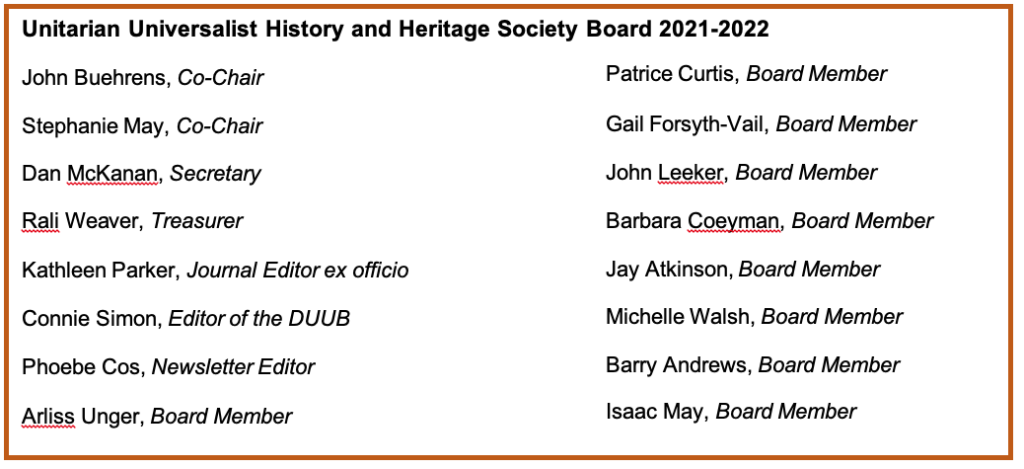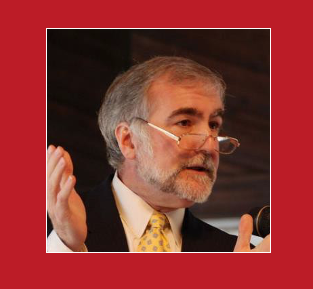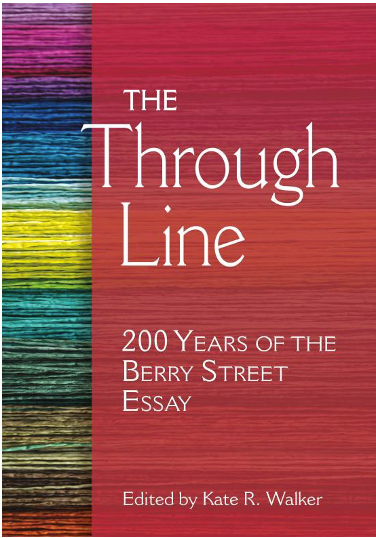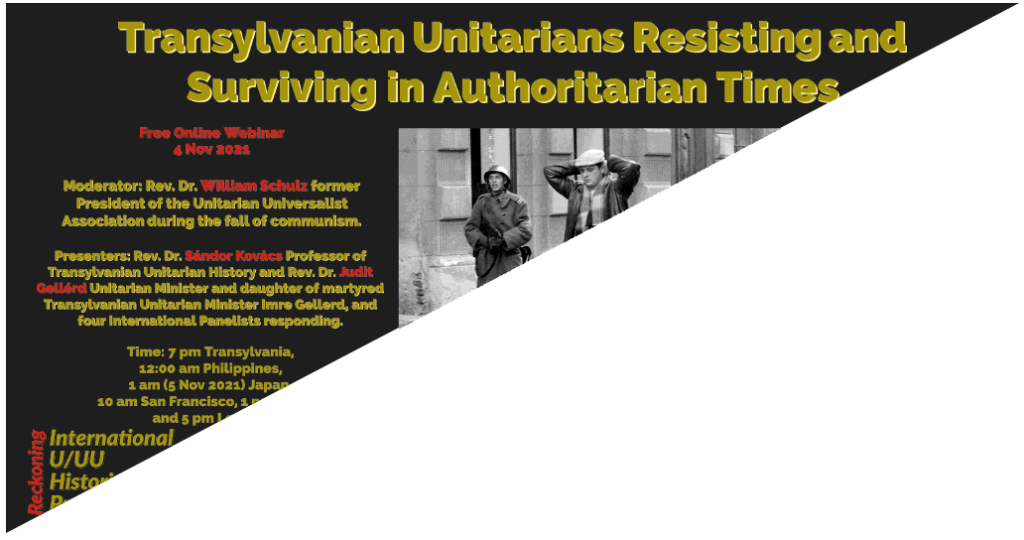Fall 2021 Newsletter
From the Co-Chairs
We did it! After a creative, careful and collaborative process that took a year and a half,the UU History and Heritage Society annual meeting on August 14 voted overwhelmingly tocombine forces with Collegium. The new name is the Unitarian Universalist Studies Network.We also adopted new bylaws.
We plan to rename our journal as the Journal of UU Studies, expand its editorial boardand that of the Dictionary of UU Biography, strengthen our Congregational Histories Project,and increase our online presence and support new online conversations, including internationalones such as the “Reckonings” project developed by our colleague, Rev. Claudia Elferdink.
Through our new Socinus Fund, there are prizes and translation awards for scholarshipabout our spiritual forebears among the Polish Brethren.
During the pandemic, we have held expenses to a minimum by holding no face-to-facemeetings, doing everything over Zoom. We are eager to meet in person, and plan a UU StudiesConvocation, probably for 2023, in collaboration with Meadville/Lombard Theological School.
They have graciously agreed to provide us with administrative and financial services previouslydone for UUHHS through the First Parish and Church in Dedham, MA.
In keeping with the report of the UUA Commission on Institutional Change, we hope thatstrengthening historical and theological reflection will fit us for a more just and inclusive future.Our new bylaws commit us to accountability to historically marginalized communities within ourown midst and beyond. We are now working on next steps in implementing that commitment.
With earnings from our modest endowment, a recent legacy gift from UUHS memberTom Belz, and the $10,000 that Collegium brings to the new UUSN, we have decided to keepmembership dues – at least for now – at the modest level of $50/year ($30 for students andthose on limited incomes) and $125 for three years. This includes a printed copy of the annualJournal. We will also seek larger donations, however, in support of UU Studies generally, andespecially for scholarships that will make our future face-to-face gatherings (may they returnsoon!) as well as online outreach, as inclusive as we aspire to be.
In the year ahead, an interim Board of Directors will lead the new UU Studies Network.
Their names (and any present responsibilities) are below our own.
Both of us, as the outgoing leaders of UUHHS and Collegium, have agreed to serve onemore year only, in the interest a smooth transition. The remaining interim board, including Prof.Dan McKanan, Secretary, and Rev. Rali Weaver, Treasurer, committed to one year and maybe nominated to continue.
The nominating process, however, is entirely open. The entire Board of Directors willreceive suggestions for new leadership and new directors. Please help us by volunteeringyourself for a particular role suggesting whom we should approach to fulfill the vision behindthis new and more inclusive vision of Unitarian Universalist studies.
Yours in collegiality,
Stephanie May and John Buehrens
Unitarian Universalist History and Heritage Society Board 2021-2022

A Note from Your Journal Editor
Dear Friends…
On this October morning, as we consider the opportunities made possible with the formation of our new UU Studies Network, I write to share some thoughts about the hopes we have for our journal in the years ahead.
The Unitarian Universalist Studies Network – founded in 2021 via a merger of the UU Historyand Heritage Society and UU Collegium – is committed to encouraging valuable original researchdone to investigate our UU and liberal religious past and to integrate findings gained from seriousethical and theological exploration.
We expect that this work will build on existing knowledge while more fully interrogating ourshared anti-oppression lens of awareness. We believe that this new intersecting framework of study will challenge and deepen our sense of who we have been and who we aspire to be as UnitarianUniversalists today.
We hope you loved reading the articles in our last issue, vol. 44, which includes Mark Harris’delightful exploration of the U and U body and mind connections in the nineteenth century, twofascinating stories of Universalist leadership in that same period from Paul Beedle and DeidreJohnson, and J. Sylvan’s look at twentieth-century gay rights work at the Arlington Street Church.
This culminates with a journey into the Transylvanian Unitarian archives of centuries past with RobertKokenyesi’s translation of sermons from 1597, a portion of Borbála Lovas’s scholarship on thesermons, and Claudia Elferdink’s research on Anna Eddy Richmond and the origins of relations amongAmerican, English, and Transylvanian Unitarians.
Looking to our next issue of the journal, we invite submissions that offer valuable originalresearch based on UU history, ethics, and/or theology. We are certain that some of you are doingvaluable work that should be shared more broadly. As always, we expect work to be documented withcitations to the sources used. Submissions should be approximately 20-35 pages in length in Word,double spaced, size 12 typeface.
Best wishes for a good fall season from your journal editor!
Kathy Parker
Minns Lectures Series

Lecture 1: Where Do We
Come From?
Rights describe a good society. Just as our notion of the “good society” may change from generation to generation, so should our understanding of rights.
October 7 at 7:00 PM (Eastern)
On Zoom, hosted by First Church Boston, King’s Chapel, Unitarian Universalist Service Committee
Respondent: Elías Ortega, Ph.D.
Lecture 2: Brave New World?
If rights change with changing circumstances, some rights may need to be reconceived. Today new technologies can track our every step and even produce “designer babies,” so how should we update the rights to privacy and personal sovereignty?
October 14 at 7:00 PM (Eastern)
On Zoom, hosted by First Church Boston, King’s Chapel, Unitarian Universalist Service Committee
Respondent: Rachel Gore Freed
Lecture 3: Do Robots Have Rights?
How about Rocks?
Animals, robots, and even ecosystems need to be considered holders of rights if we truly want to create a good society.
October 21 at 7:00 PM (Eastern)
On Zoom, hosted by First Church Boston, King’s Chapel, Unitarian Universalist Service Committee
Respondent: Rev. Mary Katherine Morn
After decades of promoting human rights, Rev. Dr. William F. Schulz will challenge us to think hard about how rights evolve with changing circumstances, and what rights will look like ten, twenty, or fifty years from now
Co-sponsored by the Minns Lectures Committee and the Unitarian Universalist Service Committee.
Rev. Dr. William F. Schulz served as president of the Unitarian Universalist Association before becoming executive director of Amnesty International USA in 1994 and then president of the Unitarian Universalist Service Committee from 2010 to 2016. He is co-author with Sushma Raman of The Coming
Good Society: Why New Realities Demand New Rights (Harvard University Press).
Register at no cost to attend at www.MinnsLectures.org.

Reflections on The Through Line: 200 Years of the Berry Street Essay
By Rev. Barbara Coeyman
I want to add to communications from Rev. Dr. Kate R. Walker, former President of UUHHS, about the recent release from Skinner House of The Through Line: 200 Years of the Berry Street Essay, edited by Rev. Kate, with reflections by a team of a dozen other contributors. I encourage subscribers of this newsletter to read this new publication, hot off the press. While The Through Line it is not intended as a history of liberal ministers per se¸ this volume offers an important and very needed overview — through the lens of the Berry Street Essay — of the history of ministry in our liberal faith tradition. In the words of the publisher:
 For more than two hundred years, Unitarian and then Unitarian Universalist ministers have gathered to hear one of their own deliver an essay of reflection and critique on their profession. The Ministerial Conference at Berry Street, or as it’s more commonly known, the Berry Street lecture, was started in 1820 by famed Unitarian minister William Ellery Channing.
For more than two hundred years, Unitarian and then Unitarian Universalist ministers have gathered to hear one of their own deliver an essay of reflection and critique on their profession. The Ministerial Conference at Berry Street, or as it’s more commonly known, the Berry Street lecture, was started in 1820 by famed Unitarian minister William Ellery Channing.
In The Through Line, Berry Street scribe Kate R. Walker and contributors look back over the essays on record and offer analysis on what was said and the historical context surrounding them; selected essays have also been included in this volume. The voices and ministry of thundering preachers, inspiring activists, and dedicated academics point toward a compelling future. When examined as a whole, their threads weave a rich and complex pattern.
And yet Walker and contributors also look at what was not said and who was not invited to speak. As Unitarian Universalism enters a new era of ministry in our congregations and outreach to the wider world, our commitment to being a radically inclusive faith demands these teachings. Our survival as a liberal religious faith
depends on learning from our failures so we don’t repeat them.
In addition to making a pitch for UUs to read The Through Line, I want to describe my personal experience serving on the team who wrote the reflections on the Essays. During the months of research and writing, as this team conferred with one another about our particular historical segment of the Berry Street lectures, we were astounded to realize that most essayists before the twenty-first century did little to address major events in social and political life of the time of their lecture. For example, in Essays from the decade I reviewed — the 1860s — no mention of the Civil War, or essays from the 1960s which said little about racial turmoil in the denomination and the wider society. We questioned how relevant liberal ministry of the past was to the lives of people both in and out of our liberal tradition. Modern readers must take to heart what was said and what was left out in Berry Street Essays of the past. As liberal faith “enters a new era” into the 21st century, the lessons about the past uncovered during production of this volume remind us of the importance of putting into practice anti-oppressive values we profess in principle. This new publication offers us important new insights about faith and ministry, a vital addition to personal and church libraries.
Upcoming Events
Polish Brethren Contest Announcement
On behalf of the Socinus Endowment Fund, the Unitarian Universalist Studies Network is pleased to announce a 2021 contest for scholarly papers that address some aspect of the history and influence of the Polish Brethren—their theology, ecclesiology, social ethics, or organizational history and the relevance of their ideas for modern Unitarian Universalist thought and practice.
The contest is open inclusively to students and established scholars, clergy and laypeople, academics and independent scholars.Papers should be roughly 4000-7500 words in length, including footnotes, draw on primary sources, be organized around a clear thesis, and adhere to rigorous scholarly style and standards. Papers should be submitted in Word.docx format and sent by email attachment to Dan McKanan, at dmckanan@hds.harvard.edu.For the purpose of “blind” evaluation, the author’s name and contact information should be submitted separately from the body of the paper itself.
A prize of $500 will be awarded to the writer of the best qualifying submission. Deadline for submissions is November 1, 2021.
Questions may be directed to Jay Atkinson: JayAtk40@gmail.com
Save the Date
Transylvania Unitarian Resisting and Surviving in Authoritarian Times
Free online seminar, November 4, 2021.

